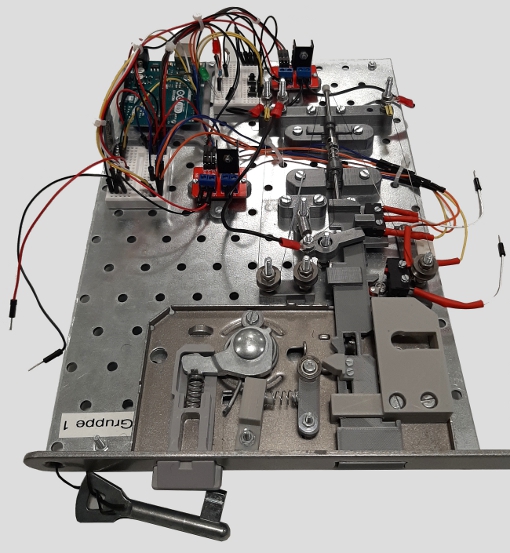
School of Electrical Engineering and Computer Science
Are you fascinated by the functioning of complex devices, machines and technical systems and would like nothing better than to create something of your own? This degree programme offers a perfect start to a career in engineering!
| Degree | Bachelor of Engineering & (only in dual study programme) vocational qualification in Mechatronics |
|---|---|
| Start of study | Winter semester |
| Application period Winter semester | 01 June until 15 July |
| Standard period of study | 7 semesters |
| Credits | 210 |
| Accredited | Yes |
| Admission restricted | Yes |
| Admission requirements |
|
| Language of instruction | German |
| Faculty/institution | School of Electrical Engineering and Computer Science |
| Stay abroad | Optional |
| Study format | Stay abroad optional, Dual study optional |
The degree programme Automation/Mechatronics (ATMECH) has two profiles: Automation and Mechatronics. While the focus in the automation profile is on the development and control of industrial robot and automation systems, the focus in the mechatronics profile is on the computer-aided development of systems comprising mechanics, electronics, and software.
The degree programme in Automation/Mechatronics can be studied in a standard, dual study, international variant.
While in the standard version the course content is taught with a strong practice-orientation at the university in the form of seminar classes, exercises and laboratories, the dual study is supplemented by a practice phase spent in a cooperating partner organisation, and the international variant by a period of one semester studying abroad.
© HSB
The task for the students within the project "Robot Platform" was the theoretical design, development, construction, and commissioning of a highly manoeuvrable robot platform equipped with a gripper made of a shape memory alloy as well as a camera for tag recognition, which recognises the spatial position of parcels of different sizes so that the gripper can grasp them. Furthermore, the packs are to be filled with granulate in a filling station and then deposited in a magazine. When requested by an operator, a full package (small, large) is to be discharged from the magazine. The project has been worked on in a project organisation involving different teams under adherence to a deadline and cost framework.
© HSB
The students' task for the Smartlock project within the course ‘Designing with New Actuators’ was the theoretical design, development, construction, and commissioning of a locking device with shape memory actuators and contactless control via smartphone. The locking device consists of an automated linear actuator that can be used for keyless locking and unlocking of a door mortise lock by means of a very simple, compact. and noiseless actuator made of a shape memory alloy. This door lock can be controlled via a smartphone app in the sense of the Internet of Things (IoT). Various project groups have solved the task electromechanically in a very individual way based on a specification sheet.
© HSB
The task for the students in the project ‘AuBaMo - Automated Battery Assembly’ within the course ‘Designing with New Actuators’ was the theoretical design, development, construction, and commissioning of a device for the fully automatic assembly of button cells into a holder using shape memory actuators. In addition to the sensor-controlled feeding of battery and battery holder, the participating students implemented the assembly process in teams in a very individual way while complying with technical constraints.
Hochschule Bremen in general, as well as the School of Electrical Engineering and Computer Science in particular, have partner universities and partner faculties all over the world. The agreements agreed between the School and the foreign partners regulate the exchange of students and supplement studies with an international component. Feel free to contact us if you have any questions about studying abroad during your studies.
The teaching content of the Automation and Mechatronics degree programmes has a high degree of practical relevance due to numerous interfaces with cooperating industrial companies. These cooperations take place in the area of research as well as in teaching: current needs are monitored through numerous industry-related final theses as well as through the dual study programme with its established advisory boards. In this way, the teaching content of the degree programmes can be neatly tailored to the requirements of industry.
Through numerous externally funded collaborative projects, the School is in close contact with a number of small and large industrial companies and thus gains insight into their operational needs for technology as well as personnel needs for graduates.
First, check the application deadlines and admission requirements for your desired degree programme.
For the dual study variant, you must also find out about available places at a partner company.
Any questions you may have about the degree programme itself can be answered by the contact persons on the respective web pages. If you have any further questions about your decision to study at HSB, our counselling and service facilities will be happy to help.
The following applies to the dual study programme: You first apply to the partner company with which Hochschule Bremen has concluded a cooperation agreement for the implementation of the degree programme. You then register in HSB application portal.
The following applies to the conventional degree programme: You submit your application directly to Hochschule Bremen.
The following applies to the dual study programme: You enrol with the practical training/study contract that you have already concluded with a partner company.
For the conventional degree programme, the following applies: You enrol after you have received confirmation of admission from HSB.
The following applies to the dual study programme: You start your practical training in the company on 1 August or 1 September. Your studies at the Hochschule Bremen begin in the autumn.
If you are enrolled for the conventional degree programme, you start your studies at Hochschule Bremen in the autumn.

